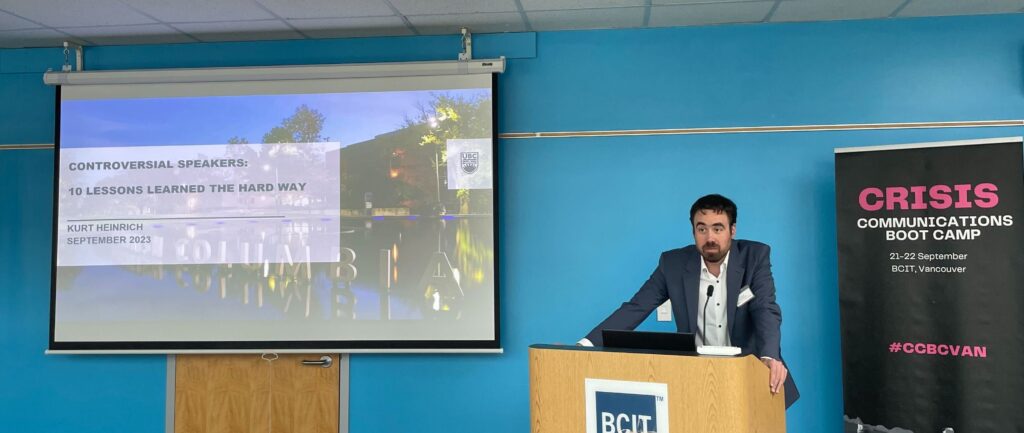P World Crisis Communications Boot Camp Review
The P World Crisis Communications Boot Camp is a two-day conference designed to enhance your skills and refresh your crisis plan through case studies and interactive exercises.
Hosted in various cities, the P World Boot Camp offers a unique opportunity to build your network while gaining valuable insights into managing issues and crises. I recently attended in Vancouver, where I work at a major university.
As a junior communicator, I was itching for a professional development opportunity to dive deep into crisis communication and issues management. P World puts on some well-known communications conferences, so when the opportunity to attend this one presented itself, I immediately said yes. I was excited to learn alongside like-minded communicators interested in polishing their craft.
Day 1: Presentations from Crisis Communications Experts
The first day featured presentations from leading experts in crisis communications from various industries and sectors, including higher education, healthcare, global organizations, and local grassroots consulting. Some were in-house communicators and others were agency professionals.

Presentation topics ranged from reputation management from the inside out, to the impact of a lack of diversity on reputational crises and preparing your team for a cybersecurity threat.
The diversity of perspectives kept the day engaging and insightful.
Two presentations stood out to me: the role of diversity in averting a reputational crisis and the importance of preparing your team for a cybersecurity threat.
The Role of Diversity in Averting a Reputational Crisis
The presentation on diversity was validating and meaningful to me as a person of colour working in communications. With all the recent talk about recognizing and embracing diversity in this field, it was great to see the presenter demonstrate the practicality, relevance, and necessity of incorporating diversity in reputation and crisis management.
By prioritizing diversity as an organizational imperative, we are rewarded with diverse solutions and strategies, building trust with our stakeholders and beyond, and therefore improving the organization’s reputation.
Preparing for a Cybersecurity Threat
I was also glad to learn about cybercrime, cybersecurity threats and related issues as these continue to pose a growing threat and are some of the most damaging reputational crises. This is especially true for high-value organizations in critical infrastructure, including universities like the one where I work.
As a communicator, I recognize the impact these issues might have on my university. I had already experienced a ransomware incident while doing my undergraduate degree in Ottawa, so this presentation was a great reminder to prepare for a potential cyberattack.
The presentation also touched on issues around generative AI and disinformation. The university I work for is constantly working to spearhead research on AI and generative AI. Similarly, discussions are taking place about the use of AI in communications work.
As a communicator who works with media, I understand the role we play a role in combatting disinformation. Despite learning the potentially scary ramifications of cybercrime and related issues, I am grateful for the practical tips from the presentation and the importance of being proactive around these issues.
Day 2: Crisis Communications Scenario and Tabletop Exercise
The second day was dedicated to a tabletop exercise led by Irene Payne, a seasoned communicator and associate director of crisis communications at Kenyon International Emergency Services. It was no doubt, the most thrilling and exciting day of the Boot Camp.
Payne began the session by introducing herself before diving straight into the exercise. The scenario she presented was about a school bus carrying children who are medically fragile with significant physical and learning disabilities in a medium-sized school district in a large geographical mountainous area.

Throughout the day, Payne worked with us every 15-20 minutes to provide us updates, and we got together in groups to determine our plan of action.
During the exercise, we had the chance to share our approach with the larger group. This led to discussions about the various approaches suggested, which was helpful.
This was by far, my favourite part of the conference. It was an interactive, insightful and effective method for learning how to do crisis communications. I got a lot out of collaborating with fellow delegates with wide-ranging levels of experience. Most of all, it felt safe to make mistakes and have open conversations around these mistakes.
Networking Opportunity
One of my favourite parts of the conference was the opportunity to network, as cliché as it sounds. Throughout the two days, we had breaks every two hours, and I took the time to connect with different communicators. I still connect with some of them today, discussing similar issues facing our different organizations.
As great as all the networking sounds, I think the effectiveness of networking depends on the conference’s location. Some versions of this Boot Camp might draw participants primarily from specific geographical areas, which could limit opportunities for relevant industry and regional connections.
On the other hand, it could be a fantastic way to widen your net and diversify your possibilities.
I Would Do It Again
Overall, the Boot Camp was helpful in building my skills and spearheading my interest in crisis communications. The presentations from Day 1 complemented Day 2’s tabletop exercise. I was glad that there was an opportunity to apply the knowledge learned into practice.
It was also rewarding to connect with communicators from different regions, sectors and agencies. Sometimes when you work as an in-house communicator, you forget that there are other possibilities and approaches in communications.
I would attend this conference again. For now, I continue to apply what I learned from the conference to my work.